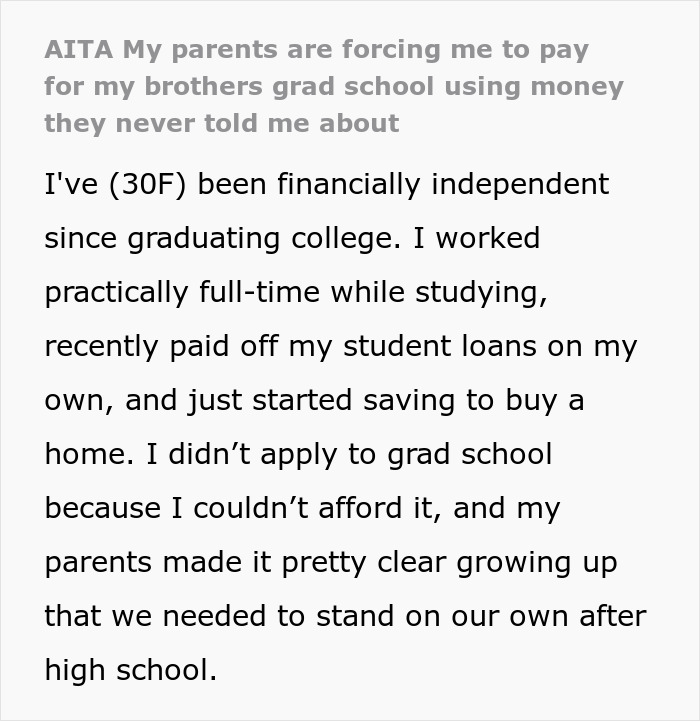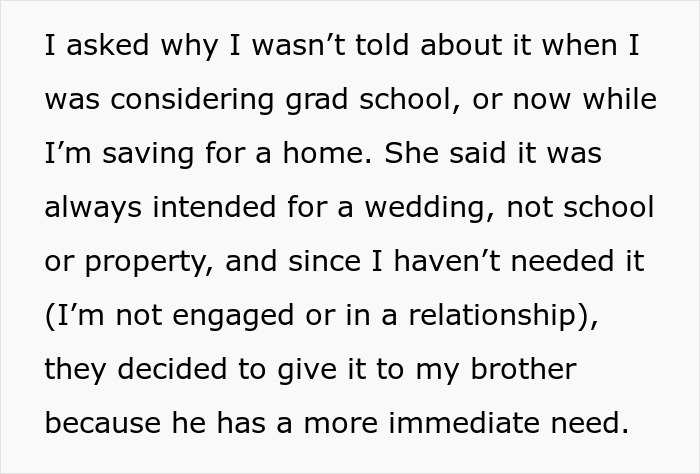Money can often create a lot of tension in families, particularly when people who don’t possess it start to feel entitled. Favoritism, fears of favoritism and just lifestyle mismatches can all come together to create arguments and drama where there should be love and understanding.
A woman asked the internet if she was wrong to be unhappy after learning that her parents wanted to use her secret wedding fund to pay for her brother’s grad school. We reached out to the person who made the post via private message and will update the article when she gets back to us.
Learning your parents have set aside money for you can be a great feeling

Image credits: macniak / envato (not the actual photo)
But one woman learned that her parents planned to use her wedding fund for her brother’s education






Image credits: drazenphoto / envato (not the actual photo)



Image credits: Throwaway3568476985
It shouldn’t come as a surprise that money can really give people a headstart
When parents set aside a nest egg for their children, whether it’s a college fund, a down payment for a first home, or inheritance savings, it’s done with love and foresight. Yet even the most well-intentioned financial gift can become a source of tension and drama, as expectations, entitlement, and family dynamics collide. What begins as a promise of support can quickly spiral into arguments over fairness, responsibility, and the right to control the money.
One common flashpoint is perceived inequality among siblings. Even if each child receives the same dollar amount, their needs and life stages almost never line up neatly. A twenty-two-year-old fresh out of college may need tuition help, while a thirty-year-old saving for a house alone might require a larger sum. When one sibling’s request feels more urgent or substantial, the other may view it as favoritism, breeding resentment and cold shoulders at family gatherings. Parents who try to allocate funds “evenly” often find that equal amounts do not translate into equal impact.
Expectations about how the money should be used also stir conflict. Parents might imagine their daughter making her “dream wedding” when, in reality, it was only their dream to begin with. As many commenters note, this is a pretty old-fashioned approach, and really seems quite unfair that the son gets a college fund but the daughter, apparently, is just supposed to get married.
At the same time, jealousy and entitlement are relationship killers

Image credits: Image-Source / envato (not the actual photo)
Moreover, the arrival of funds can disrupt relationships. A child who suddenly accesses significant money may see an uptick in requests from friends or extended family, leading to awkward situations that reflect back on the parents who provided the sum. Meanwhile, siblings left out of these windfalls might demand explanations or even legal recourse, turning private family disagreements into public disputes. Social media exacerbates the drama: a casually shared graduation gift photo can ignite a barrage of comments from envious cousins and ill-informed onlookers.
Finally, parents themselves can feel unexpected guilt and stress. Watching their children squabble over money intended as a unifying gesture can be heartbreaking. They may revisit their own decisions, wondering if they should have saved more, saved less, or simply left their children to fend for themselves. The emotional burden of playing “fair judge” among loved ones often outweighs the financial burden of the funds themselves.
In the end, setting aside money for children isn’t just a financial act, it’s a chain reaction in a web of relationships, hopes, expectations and insecurities. To minimize drama, families can embrace transparency, discussing intentions, criteria, and expectations openly, and consider structured vehicles like trusts with clear guidelines. Equally important is nurturing the values behind the gift: hard work, gratitude, and mutual respect. When money becomes a tool for teaching rather than just giving, it’s more likely to bring families closer than tear them apart.
Many thought she was right to be unhappy



















Some thought it still wasn’t her money




A few thought the whole situation could have been handled better









